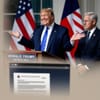US President Donald Trump joked about artificial intelligence "taking over the world" while signing a landmark technology deal with UK Prime Minister Keir Starmer. The "Tech Prosperity Deal" aims to deepen cooperation in emerging technologies like AI, quantum computing, and nuclear modernization. Trump candidly admitted his limited understanding of AI, turning to Treasury Secretary Scott Bessent and asking, "Should I sign this? Are you sure, Scott? If the deal's no good, I'm blaming you." He then addressed Nvidia CEO Jensen Huang, saying, "This will create new government, academic, and private sector cooperation in areas like AI, which is taking over the world... I'm looking at you guys. You're taking over the world. Jensen, I don't know what you're doing here".¹
The deal includes developing AI models for healthcare, advancing quantum computing, and modernizing nuclear programs. As part of the agreement, Nvidia pledged to deploy 120,000 graphics processing units across the UK, marking its largest rollout in Europe. This investment is expected to strengthen Britain's role in AI research and infrastructure, potentially turning it into one of Europe's most important AI hubs.
In a parallel move, Nvidia announced a $5 billion investment in Intel, coupled with a collaboration on new products. The two companies will work together on custom data centers that support AI systems and processors for personal computers. This partnership is seen as a lifeline for Intel, which has struggled to keep pace in the AI hardware race. Nvidia's CEO Jensen Huang framed the move as laying the foundation for the next era of computing.²
The US and UK are also focusing on competition in AI, with the US Justice Department monitoring for anticompetitive behavior in the sector. Assistant Attorney General Gale Slater emphasized the importance of access to key inputs and distribution channels in AI development.


